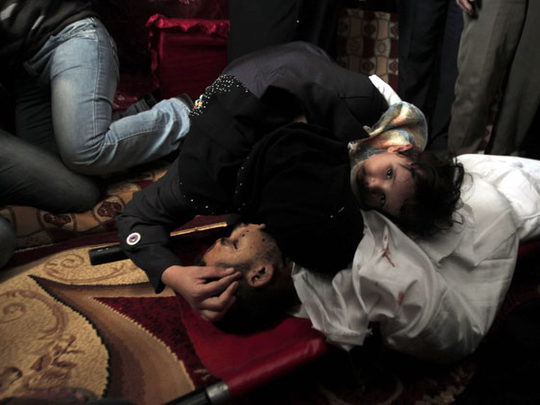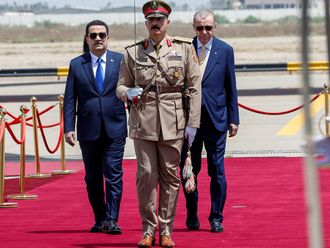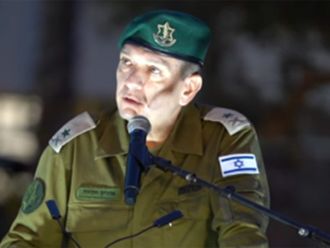
Occupied Jerusalem: Israel’s surprise air assault on Gaza Strip militants killed the top military commander of Hamas and set the rivals on a familiar course that could end with another major confrontation - but in unpredictable new circumstances created by the Arab Spring.
Compared with its past campaigns against Hamas, Israel is likely to find itself more restrained politically and militarily in the new landscape. Rather than being able to count on former Egyptian President Hosni Mubarak to help isolate Hamas, as he did during a 22-day operation four years ago, Israel must weigh whether another large-scale Gaza offensive would endanger the landmark 1979 peace accord with Egypt, which has long served as a cornerstone of regional stability.
By Wednesday evening, Egypt’s new Islamist president, Mohammad Mursi, announced he was recalling the country’s ambassador to Israel to protest the assault on the Palestinian territory.
“It’s a completely new game for Israel,” said Yoram Meital, an Egypt expert at the Herzog Centre for Middle East Studies and Diplomacy at Ben-Gurion University. “The equation before was between Israel and the Palestinians. Now it’s a triangle, involving Egypt too.”
Israel’s offensive four years ago killed 1,200 Palestinians, but Mubarak brushed aside his own people’s support for besieged Gazans and helped Israel seal Gaza’s border. The course of Israel’s military campaign could be shaped by Mursi’s decisions, analysts say.
Unlike his deposed predecessor, Mursi will find it difficult to ignore the anti-Israel mood of the Egyptian street. Israel is worried Egypt might open the Rafah border crossing to humanitarian aid or even Islamic fighters to help Gazans, Meital said. “Israel is taking a very bold risk here because if this campaign continues, it could be gambling with the relationship with Egypt,” he said. Both Hamas, which has been emboldened by the new Egyptian government, and Israel, which has clashed repeatedly with it, will be watching closely to see whether Mursi comes out more strongly against Israel in the coming days or adopts a more pragmatic approach, perhaps trying to broker a cease-fire.
Besides public sentiment, Mursi must take into account his relationship with the US and other world powers. He is seeking billions of dollars in aid and investment from the West to help the Egyptian economy. Some analysts say that even though Mursi will have to respond to be a credible Arab leader, Egyptians are more concerned with domestic problems.
Egyptian tribal leaders have blamed Hamas and other Palestinian groups for aiding the resurgence of deadly militant networks in the Sinai peninsula, who have attacked Egyptian government forces there. Although he recalled his ambassador, Mursi did not immediately comment in public.
But other leaders in the Muslim Brotherhood organisation said the country would not tolerate another Israeli campaign in Gaza. “The brutal aggression on Gaza proves that Israel has not yet learned that Egypt has changed,” said Saad Katatni, head of the Muslim Brotherhood’s Freedom and Justice Party.
Israeli military officials said the assault could last several days. The campaign is aimed at “defending the people of Israel who have been under rocket attack and crippling terrorist organisations’ capabilities,” said Israel Defence Forces spokeswoman Avital Leibovitz.
Tension between Israel and Gaza militants has been mounting for nearly a week, following a missile attack against an Israeli jeep along the Gaza border that left four soldiers wounded. In the ensuring back-and-forth violence, Hamas and other militant groups fired more than 120 rockets and mortar rounds into southern Israel, injuring several Israeli civilians and damaging property.
Israeli Prime Minister Benjamin Netanyahu has faced growing pressure to move aggressively to stop the attacks, which have terrified nearly one million southern Israelis and crippled daily activities. Over the last year, Hamas, an offshoot of the Muslim Brotherhood, has resumed a more hostile stance toward Israel, betting that Mursi’s election would strengthen its hand.
After observing a self-imposed cease-fire for most of the last four years, militants in recent months increased their attacks on Israel, using new types of weaponry acquired in Libya last year after the chaotic fall of Colonel Gaddafi, such as anti-tank and antiaircraft missiles.
“Hamas felt they had enough power to stand face to face with Israel, especially with the upcoming [Israeli] election,” said retired Major General Dan Harel, the former head of the IDF’s southern command. “They thought we would not retaliate.”
The first target Wednesday was Ahmed Jabari, 52, who led the Izzidin Al Qassam Brigade, the Hamas military wing. He and three other people in a car were killed in the Israeli airstrike in Gaza City, Hamas officials said.
Jabari played a key role in Hamas’ takeover of the Gaza Strip in 2007 and in last year’s release of captured Israeli soldier Gilad Shalit. Israeli officials say he also masterminded attacks on Israelis. “He has a lot of blood on his hands,” Leibovitz said.
The strike was followed by nearly two dozen Israeli airstrikes throughout the territory, focusing on rocket launchers, long-range rocket caches and other weaponry. Leibovitz would not say how long the operation was expected to last or whether it would include ground operations.
Military officials said ground forces were standing by. “Airstrikes might not be sufficient,” one military official said. Analysts said Israeli leaders would prefer to avoid a major ground assault, but the decision will depend on how Hamas reacts. “I think we are witnessing a larger operation that will probably be ongoing in the next few days,” said Major General Israel Ziv, a former commander of the IDF’s Gaza division and now a military analyst.
“It’s probably a big shock for Hamas to get such a hit,” he said. “I assume there’s going to be an escalation in the next few days.”
Hamas leaders immediately vowed to retaliate, saying the killing of Jabari would take hostilities with Israel to a new level. “The assassination of the commander Ahmed Jabari is tantamount to a declaration of war, and the occupation will pay a heavy price for it,” Hamas said in a statement.
At least seven other people were killed and 25 were wounded, Gaza hospital officials said. Minutes after Jabari’s killing, Palestinian militants resumed firing rockets into southern Israeli towns. But many of the rockets were blocked by Israel’s missile defence shield known as Iron Dome. Schools in southern Israel have been cancelled indefinitely and the government approved the calling up of army reserves.
After conferring with his cabinet on Wednesday night, Netanyahu said Israel would no longer tolerate the rocket attacks. “Today we delivered a clear message to Hamas and other terror organisations, and if need be, the IDF is prepared to expand the operation, and we will continue to do everything to defend our citizens.”











